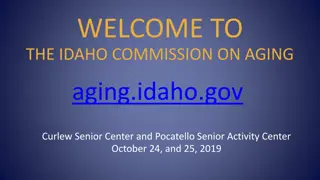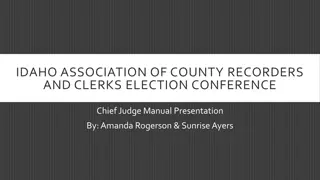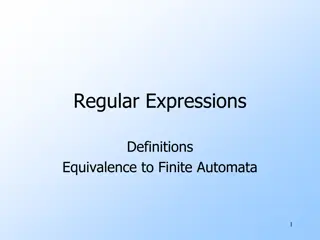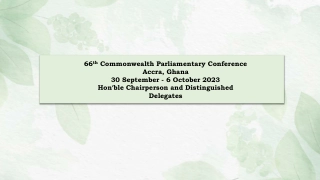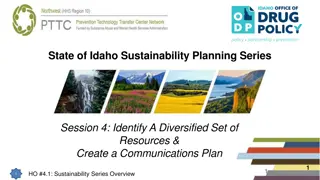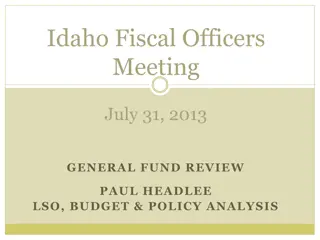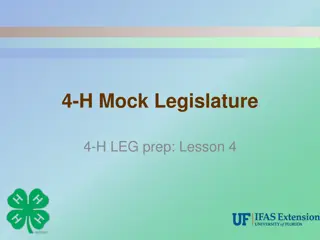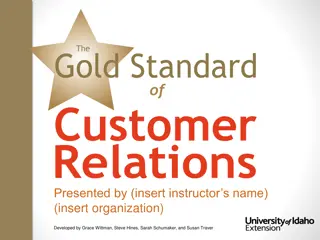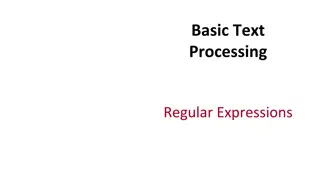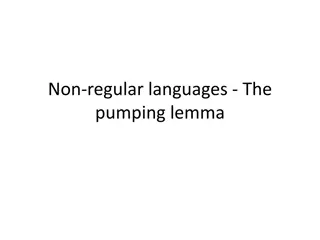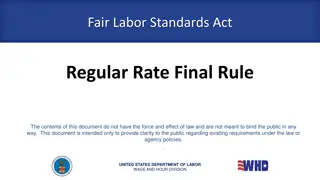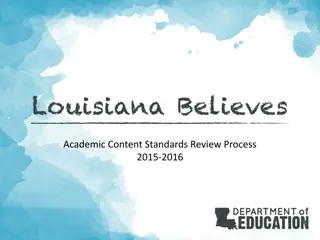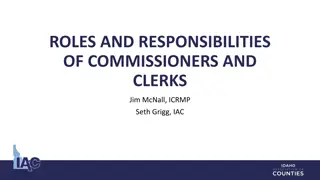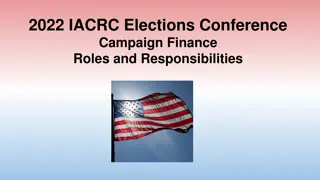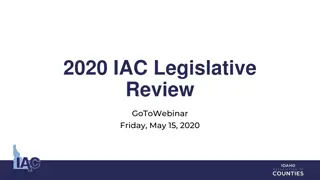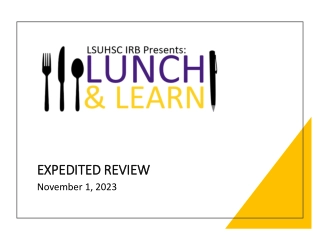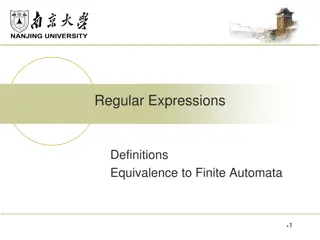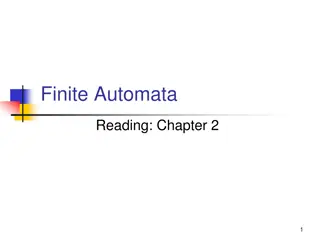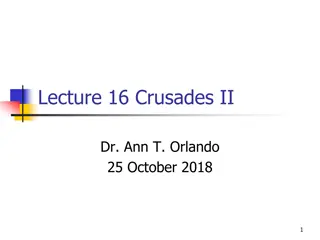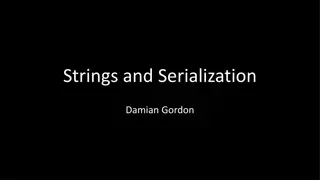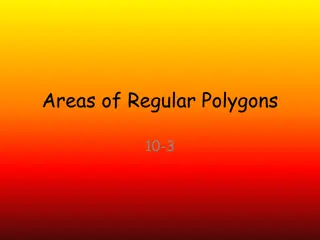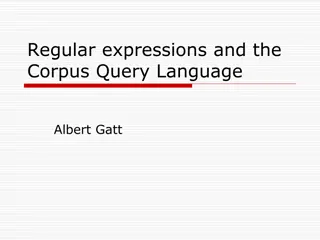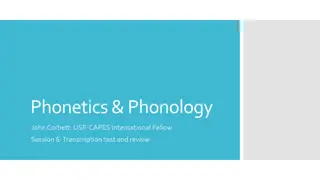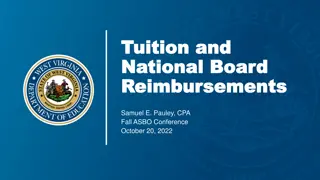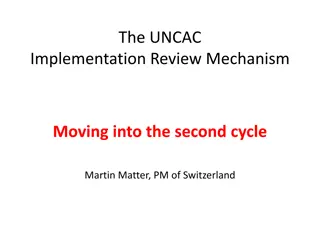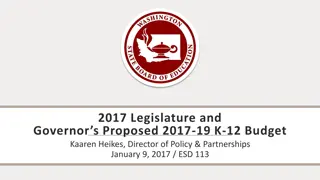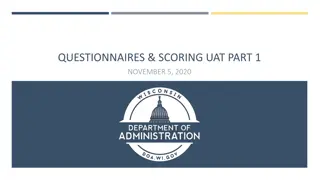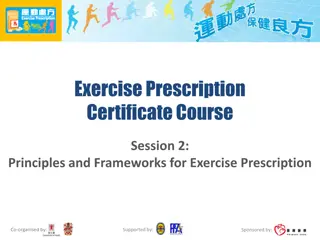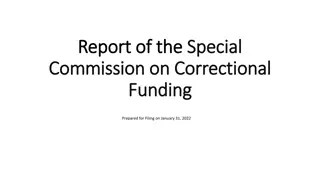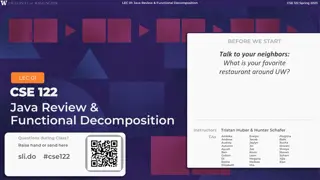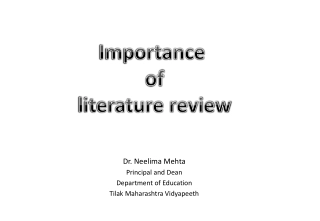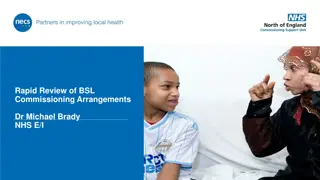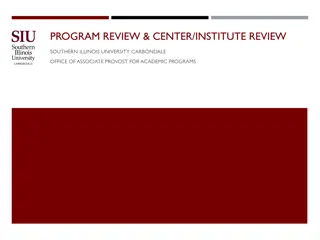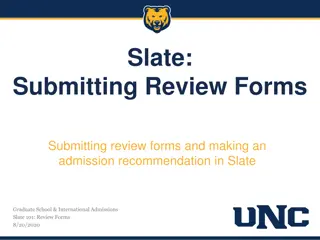Review of the First Regular Session of the 66th Idaho Legislature
The first regular session of the 66th Idaho Legislature involved discussions on property taxation, particularly focusing on House Bill 73 regarding local government financial reporting. The session established a committee on local government uniform accountability and transparency, aiming to standardize accounting practices. Furthermore, there were plans to create a local government portal for public financial information display. Various reports were to be submitted to the State Controller's Office for better transparency and comparative analysis.
Download Presentation

Please find below an Image/Link to download the presentation.
The content on the website is provided AS IS for your information and personal use only. It may not be sold, licensed, or shared on other websites without obtaining consent from the author. Download presentation by click this link. If you encounter any issues during the download, it is possible that the publisher has removed the file from their server.
E N D
Presentation Transcript
REVIEW OF THE FIRST REGULAR SESSION OF THE 66THIDAHO LEGISLATURE Seth Grigg, Executive Director Sara Westbrook, Policy Director Kelli Brassfield, Policy Analyst
DURING THE SESSION IAC s Legislative Committee meets frequently and may take positions on specific legislation that impacts Idaho s counties.
HOUSE BILL 73: LOCAL GOVERNMENT FINANCIAL REPORTING Sponsor(s): Representative Jim Addis, District 4, Kootenai Effective Date: July 1, 2021
H0073: COMMITTEE ON UNIFORMITY Establishes a committee on local government uniform accountability and transparency: State Controller Chair of House Revenue and Taxation Committee Chair of Senate Local Government and Taxation Committee Two House members (one appointed by Speaker, one appointed by Minority Leader) Two Senators (one appointed by Pro Tem, one appointed by Minority Leader) Non-voting members may be appointed by committee
H073: UNIFORMITY ACCOUNTING Committee to establish a manual on local government uniformity in accounting and transparency. Manual to be drafted and published by State Controller s Office (SCO) upon approval of the committee. Local government will follow manual principles when budgeting. Likely to be separate manuals for taxing district types (counties, cities, schools, special purpose districts, etc.).
H073: FINANCIAL REPORTING SCO to establish a local government portal through which local government financial information will be publicly displayed. SCO will crosswalk data reported by local governments for comparative purposes before uploading data to portal. Portal will be phased in over five years, starting with a pilot group of counties and expanding to other counties and taxing districts at a later time.
H073: FINANCIAL REPORTING The information currently submitted to LSO will be reported to SCO Other reports like the Road and Street Report and Trial Court Finance Report will continue to be reported separately. IAC is in discussion with ITD and courts about the potential of including their respective reports on the SCO portal to streamline when and where information is reported to the state.
HOUSE BILL 252: PIVOT CORNERS Sponsor: Representative Aaron von Ehlinger, District 6, Nez Perce & Lewis Effective Date: July 1, 2021 Classifies land contiguous to agricultural land that contains pivot corners or is used to store agricultural commodities/equipment as agricultural land.
HOUSE BILL 309: PROPERTY TAX DEFERRAL PROGRAM Sponsor(s): Senator Scott Grow, District 14, Ada Effective Date: January 1, 2021 Increases household income limits from $40,000 to $50,000 Adjusts the interest rate from 6% to 2% Allows for the inclusion of properties that are part of a trust or life estate Increases the total amount of funding available from the state for the program from $500 thousand to $5 million
HOUSE BILL 389: PROPERTY TAXES Sponsor: Representative Mike Moyle, District 14, Ada Effective Date: January 1, 2021 (personal property tax exemptions effective January 1, 2022)
H389: HOMEOWNERS EXEMPTION Homeowners exemption is increased from 50% of assessed value up to $100,000 to 50% of assessed value up to $125,000. A taxing district may voluntarily remove the amount exempted from the new construction roll, but it is not mandatory.
H389: CIRCUIT BREAKER Maximum circuit breaker amount increased from $1,320 to $1,500. For 2021, anyone who has applied for the circuit breaker may be eligible for a property tax reduction. Beginning in 2022, only applicants whose homes are below 125% of county median assessed value may apply for a property tax reduction. Individuals whose homes are valued above 125% of county median assessed value must apply for assistance through the tax deferral program.
H389: PERSONAL PROPERTY TAX Effective January 1, 2022, all transient personal property will be exempt from taxation. No property tax replacement money for exempted transient personal property. Effective January 1, 2022, the first $250,000 of business personal property will be exempt from taxation. Taxes from personal property subject to $250,000 exemption will be replaced annual by the state of Idaho with an estimated ongoing fiscal impact of $8.1 million.
H389: NEW CONSTRUCTION ROLL Change of use will now be added to new construction roll once improvements are made. New construction value will be added to the new construction roll at 90%. New construction associated with the termination of a revenue allocation area will be added to the new construction roll at 80%. Improvements made by a land developer will be exempt until improvements are completed.
H389: PROPERTY TAX BUDGET CAPS Annual property tax budget increases will be capped at 8%. The annual increase can come from any combination of the base 3% increase plus new construction. Intent New construction increases from the termination of a revenue allocation area are exempt from the 8% cap.
H389: PRELIMINARY LEVY RATES To determine budget growth from new construction, a preliminary levy rate must be calculated. The preliminary levy rate is calculated by increasing the highest property tax budget amount from the previous three years by three percent to arrive at a preliminary maximum budget amount. The preliminary budget is then divided by the sum of the current year locally assessed market value and the prior year operating property assessed value which will result in a preliminary levy rate. The preliminary levy rate is then multiplied by the amount on the new construction roll.
H389: CALCULATING PRELIMINARY LEVY RATE Preliminary Levy Rate: (Prior Year Budget x 1.03) (CY Loc Value + PYOP Value) CY Loc Value: Current Year Locally Assessed Market Value, PYOP: Prior Year Operating Property Assessed Market Value To calculate new construction budget capacity, multiply the preliminary levy rate by the new construction value.
H389: FORGONE PROPERTY TAXES Up to 1% of a property tax budget can come from forgone property taxes if used for maintenance and operation. The 1% forgone increase is exempt from the 8% cap, meaning, if a taxing district has forgone available, it can increase its prior year property tax budget by up to 9%. Up to 3% of a property tax budget can come from forgone property taxes if used for a capital project. The 3% forgone increase for a capital project is also exempt from the 8% cap but cannot be added to the base property tax budget. Once the capital project is completed, the forgone budgeted for the capital project expires and is no longer included in the forgone balance.
SENATE BILL 1105: PROPERTY TAX NOTICE Sponsor(s): Senator Doug Ricks & Representative Jon Weber, District 34, Madison & Bonneville Effective Date: July 1, 2021 County Treasurers allowed to include a web link on the property tax directing taxpayer to the expiration dates of bonds and levies. If a link is not included, then an insert with the information must be included with the property tax notice. Info must be archived on county website. Taxing districts are required to submit the expiration date of each voter bond and levy to the treasurer at the time of certifying to the county commissioners.
HOUSE BILL 161: DRIVERS LICENSE FEE Sponsor(s): Idaho Sheriffs Association Effective Date: July 1, 2021 Increases driver license fee on Class D licenses by $5
HOUSE BILL 308: SURPLUS TRANSPORTATION FUNDING Sponsor(s): Governor s Proposal Effective Date: April 2021 $47.2M to the Local Highway Distribution Fund 35% to Counties 35% to Highway Districts 30% to Cities One time distribution included in your April highway user payment.
HOUSE BILL 362: TRANSPORTATION FUNDING Sponsor(s): Representative Joe Palmer, District 20 & Senator Lori Den Hertog, District 22, Ada Effective Date: July 1, 2021 Increases sales tax distribution for transportation projects from 1% to 4.5%. First $80 million dedicated to state transportation projects. Excess distribution above $80 million apportioned to local units of government through the highway distribution account.
SENATE BILL 1102: ELECTRONIC VEHICLE CREDENTIAL (EVC) Sponsor(s): Brody Aston, VITU Effective Date: Expect implementation by late October Authorizes ITD to allow credentialed providers to electronically file vehicle titling and registration transactions with ITD. Assuming 100 dealers annually opt in, and 90% of their customers use the option it would reduce demand on local DMVs by 211,000 transactions a year. Loss of revenue to County Assessors could be up to $1,555,000 statewide annually including $700,000 in title fees and $855,000 in registration admin fees.
HEALTH AND HUMAN SERVICES
HOUSE BILL 74: CITY ORDINANCE AUTHORITY Sponsors: Representative Brandon Mitchell, District 5 Benewah & Latah; Senator Regina Bayer, District 21, Ada Effective Date: March 12, 2021 Clarifies that city ordinance authority does not extend beyond the corporate limits of an incorporated city.
HOUSE BILL 316: COUNTY INDIGENT PROGRAM / HEALTH DISTRICTS Sponsor: Representative John Vander Woude, District 22, Ada Effective Date: March 1, 2022
H316: COUNTY INDIGENT PROGRAM No person eligible for Medicaid or insurance is eligible for assistance through the county indigent program or the state CAT program Applications for services received prior to March 1, 2022 may be processed, including suspended applications Program remains in place for purposes of collecting and remitting debts owe to county and state Nonmedical indigent assistance will continue (i.e.: indigent burial/cremation)
H316: INVOLUNTARY COMMITMENTS Effective March 1, 2022, county no longer responsible for the following costs associated with commitment proceedings: Psychiatric expenses Medical expenses Hospital expenses Counties will still be responsible for designated examiner, transport, and court costs. Stakeholders will meet during interim on solution to provide assistance for those that do not qualify for Medicaid (likely IDHW).
H316: HEALTH DISTRICTS Beginning March 1, 2022, health district will no longer receive state general fund support. Counties will be responsible for state general fund contribution. Increased county contribution will be no less than FY2021 state general fund appropriation.. For state fiscal year 2022, the state general fund will provide funds for March-February, counties will provide funds March-July and each year thereafter.
H316: HEALTH DISTRICTS Health district budget committee responsible for apportioning additional costs among counties. State no longer responsible for health district personnel matters, including determining compensation and benefits. Health district board fixes salaries/benefits for health district employees. Health district has option to retain existing relationships with state (insurance, payroll, bookkeeping, risk management, human resources, etc.).
H316: MEDICAID EXPANSION Governor and legislator insisted counties help fund Medicaid expansion. Originally wanted to divert revenue sharing away from counties. After negotiation, will divert general funds currently dedicated to public health districts away from PHDs to cover the county share of Medicaid expansion funding.
SENATE BILL 1060: COUNTYWIDE PUBLIC HEALTH ORDERS Sponsor: Senator Steve Vick, District 2, Kootenai Effective Date: March 19, 2021 Any county wide public health order must be approved by affected county board of commissioners prior to taking effect.
SENATE BILL 1217: EXTREME EMERGENCIES Sponsor(s): Senator Kelly Anthon, District 27, Cassia & Minidoka & Senator Peter Riggs, District 3, Kootenai Effective Date: Upon Governor s Signature When Governor declares state of extreme emergency encompassing 12 or more counties, the emergency shall be revoked on the 90th day unless the legislature is in regular session or the governor convenes a special session of the legislature to vote on whether to revoke any or all power granted to the governor when the extreme emergency was declared.
HOUSE BILL 127: BROADBAND FUND Co-sponsors: Representative Megan Blanksma, District 23, Elmore, Owyhee & Twin Falls; Senator Carl Crabtree, District 7, Bonner, Clearwater, Idaho & Shoshone Effective: 03/23/2021 Creates the Idaho Broadband Advisory Board made up of 9 members (3 House members, 3 Senate members, and 3 Idahoans appointed by Governor) tasked with developing, implementing and maintaining a statewide broadband plan. It also creates the Idaho Broadband Fund. The funds will be distributed according to the statewide plan.
SENATE BILL 1042: PUBLIC CONTRACTS FOR PROFESSIONAL SERVICES Sponsor: Senator Jim Woodward, District 1, Bonner and Boundary Effective Date: July 1, 2021 Increases threshold for QBS procurement process from $25,000 to $50,000 Requires governmental entities to make selection criteria available to public Allows governmental entity to establish a prequalification list of two or more individuals/firms List of prequalified individuals/firms to be kept for five years (unless canceled by governmental entity)
INTERIM COMMITTEES Property Taxes Committee on Federalism: Payment in Lieu of Taxes Expenditure of American Rescue Plan Act Fund
REDISTRICTING Redistricting delayed until fall of 2021 6 member bipartisan citizen commission Average district size: 52,611 Acceptable range of 49,981-55,241 (10% variation) Criteria: Preserve traditional neighborhoods/communities of interest Avoid oddly shaped districts Minimize county divisions (avoid county splits where possible) Districts must be contiguous Counties within district must be connected by highways


